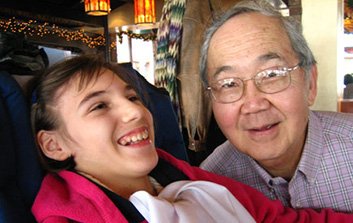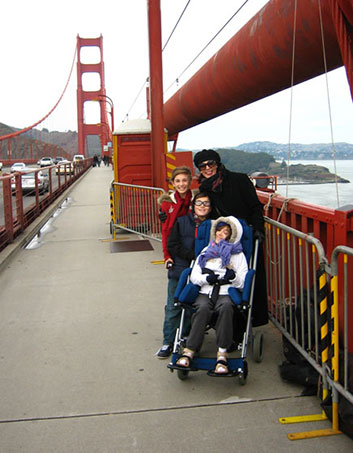Internal mini form
Contact Us Today

Caring for a child with Cerebral Palsy is a full-time obligation that can be as overwhelming as it is rewarding. Extended family members can be instrumental in helping to ensure a child’s health, education and safety needs are being met.
Extended family members play important roles
For many children, an eight-week stay with grandma and grandpa in scenic San Jose, Calif., would seem like heaven.
But when Aimee Peepgrass recently had this exciting opportunity, the tone was quite different. The now 15-year-old teen underwent delicate spine stabilization surgery, in which two rods were inserted into each side of her spine. The surgeons also completed bone grafts, which are known to be intensely painful. What followed was an eight-week recovery 70 miles away from her parents’ homes in Modesto, Calif.
“They performed the surgery to correct scoliosis. Aimee was a trooper the whole time,” said her grandmother, Julie Reiera Matsushima, who nursed Aimee back to health with her husband, Melvyn. “Aimee was always upbeat, and loved it when people came to visit her – especially her parents.”
The Peepgrass and Matsushima families are an example of how extended families can come together to raise a child with special needs. Aimee – and her twin sister Chloe and brother, Jeffrey – are the son and daughter of Jason and Janise Peepgrass, Julie Matsushima’s son and former daughter-in-law.

Although most grandparents play a role in their grandchildren’s lives, Julie makes several decisions on Aimee’s behalf. The arrangement, although it has the potential to create problems between family members – works well for this family. Neither Jason nor Janise would have been able to take eight weeks off work to help Aimee post-surgery.
And, the Matsushima’s have taken Aimee to Poland to receive specialized treatment seven times, and to Los Angeles an equal number of times, to ensure Amy receives the best care possible.
“I made a decision after Aimee was born that I would do whatever I could to help my son and daughter-in-law,” she said. “The entire family – aunts, uncles, cousins – have embraced Aimee, but I’m the only extended family member that really knows how to care for her.”
Parents looking to parents
Studies indicate that for several years grandparents have been playing a more significant role in the rearing of their grandchildren.
There is a lack of research on how many grandparents have grandchildren with disabilities living in their homes. U.S. Census data estimates that in 2000, 2.4 million families in the United States are headed by grandparents with one or more of their grandchildren living under the same roof; a 19 percent increase over the previous census.
In the case of children with special needs, the scenario that the Peepgrass-Matsushima family presents is one that is common. Many parents of children with disabilities report that the grandparents help more than if a child was able-bodied; often learning the intricacies of how to operate assistive equipment and administer medication.
It can be a rewarding experience to spend extended amounts of time with a grandchild for two reasons: It’s an opportunity to get to know the grandchild, and it’s an opportunity to give parents a chance to rest.
But there are some obstacles. Grandparents are generally older, and though seniors are generally more active than they used to be, meeting a child’s needs while enduring the process of aging can be problematic.
Julie recently turned 68 years old, and both she and her husband Melvyn have had some recent medical concerns.
“We try to stay in good shape, and I work out,” she said.
Another obstacle is that Aimee is growing up.
“The biggest challenge now is that Aimee is 15 – she’s no longer small,” she said. “It’s going to be heavy once she begins using a power chair. We’ve always driven Suburbans so we can lift her chair into the vehicle, but now we use a portable chair that we put into our smaller SUV.”
There’s also the matter of conflicting personalities, styles or opinions when talking through disagreements about the care of a grandchild with the parents. In Julie’s case, the family has been on the same page regarding all of these matters.
Julie, who speaks at senior centers, hospitals and medical centers about how grandparents can assist their children with a special needs child, said grandparents should set aside reservations about asking their children for an increased role.
“It’s hard for parents to ask for help. Some grandparents are often afraid to be involved, and they completely step away,” she said. “Take the child for the afternoon. Go for ice cream. Babysit for a few hours. It gives your children the break they need just to be a normal family.”
She also said that an essential component of the parent-grandparent agreement is trust.
“Trust is important not because my son and daughter-in-law could not take eight weeks off work when Aimee had surgery,” she said. “They need to know that their daughter is with someone that knows how to care for her.”
Aimee’s story
Aimee and Chloe were born with twin-to-twin transfusion, which typically occurs to a small percentage of identical twins before birth. Often, the affected twin does not survive this condition.
When she was born, her parents were immediately overcome.
“My son was devastated, and my daughter-in-law was overwhelmed,” Julie said. “They needed a lot of support – I didn’t know at the time, nobody really knew, what the commitment turned out to be.”
Aimee has spastic Cerebral Palsy; she uses a wheelchair for mobility and has a baclofen pump. She’s also visually impaired. However, she’s intelligent, speaks well, and communicates with the assistance of sight/auditory assistive device. She has difficulties with fine motor skills. During the coming weeks, she will be traveling to the University of California-Berkley to be assessed for a new touch-pad device.
Aimee enjoys music of all kinds, from opera to rock, to country and pop, said her grandmother.
Her sister, Chloe, and brother, Jeffrey, 12, are both athletic. Aimee enjoys cheering for her siblings during various activities.
Regarding Aimee’s siblings, Julie said that she has explained that her involvement in Aimee’s life has benefits for them, too. They get more time with their mother and father that they otherwise would not.
Today, Aimee spends about one weekend a month with Julie and Melvyn. Julie maintains Aimee’s therapies; a therapist that helps Aimee about two times a week reports to Julie just as she does Aimee’s parents.
Julie has one message for grandparents of a special needs child: Get involved; you won’t regret it.
“This is what it means to have a special needs grandchild,” she said. “It’s a gift — they are still a grandchild, and grandparents have something to offer. It’s about family – it’s about stepping up to the plate.”

Relationships and Cerebral Palsy
There’s an old saying that the measure of a person’s life is measured by how much they are loved. There’s no doubt about it: our relationships with others are the cornerstone of our ability to thrive and enjoy life. Relationships allow us to explore all of the facets of giving and receiving love, from the patient and protective concern shown between a parent and child to the fire and chemistry that happens between friends, mates and spouses. And the level of ability has nothing to with the level of love one is willing to give to or receive from another.








